A little less than two years after I began seeing Leslie at Kairos (her first memory care home), her brother and sister—both of whom lived too far away to visit regularly—asked me how she was doing. I struggled briefly to give them a quick email answer before realizing that I couldn’t. The longer email I eventually sent (see below) summarizes my observations of Leslie and of the changing questions, assumptions and concerns I’d developed while visiting her. The original letter did not include photos, but Leslie’s brother and sister had already seen a dozen or more of my photos, so I’ve included a few here as well.
– JW 19 February 2019 –
Dear Donna and Jim:
Sorry I’ve been so slow in filling in some additional details about Leslie’s current situation. I know I told you I’d send some comments “shortly,” but that is now weeks and weeks ago. I guess we had a pretty busy month or two around here, and I am all too easily distracted. Be that as it may, here are some thoughts and notes that may be useful to you. I’ve tried to give a little structure by focusing on three things: my initial questions about what Leslie’s going through (and about how to relate to her), the assumptions that have come to shape how I think about her, and my observations of how she is when I visit with her.
Initial Questions
When I first visited Leslie at her memory care home, I was struggling with questions such as these:
- Does she know where she is and what’s happening to her?
- Is both her short-term and long-term memory shot?
- Is she feeling okay about where she’s living?
- Does she like doing x, y, z, etc.?
- Would she like doing x, y, z, etc.?
- What does she really mean when she says x, y, z?
- Does she know who I am?
Accompanying those initial questions about Leslie were others about what I should do when I saw her:
- Should I read her stories, show her photos, make jokes (or not), watch TV, take her outside?
- If we walk somewhere, where should we go—and what’s the best way to make sure she doesn’t fall or otherwise hurt herself?
- What about engaging her in some physical therapy exercises?
- Would bringing the dog cheer her up?
- How can I help her keep exercising her mind and memory?
- What changes would make her living situation more comfortable or engaging?
- Is she better or worse than the last time I saw her?
- Is she getting the right medical/health care for her ailments?
Over the last year and a half, most of these questions have faded into the background for me, and new questions that I could not imagine at the outset have come to the fore. Somewhat surprisingly, the new questions are as much about me as about Leslie, and they’ve led me to rethink dimensions of my life that initially seemed pretty far removed from Leslie’s life in her memory care home.
Current Assumptions
I’m not sure I can articulate these new questions very well (and that’s not the focus of this note), but I can share three assumptions that now color pretty much everything I have been doing with and for Leslie:
Leslie thinks and feels a lot, and a lot of what she thinks and feels is relatively complex. She’s not vegetating, nor is she just bouncing around between happy and sad. She is relatively even tempered (I think/assume) and in a pretty good mood most of the time, but she is also capable of deep feelings, including delight, sadness, love and loss.

Leslie looking at cards she received from her brother and sister. When Lisa or I would read the cards to her, Leslie’s gaze followed the words we read. Once we’d finished reading, she might pause, then pick up a card and look it over again, from beginning to end. Sometimes she’d smile at the card itself or an included photo or something we said about it. At other times she she seemed totally focused on trying to understand what was written on the card. Throughout a card-reading session, she might pass through moments of delight, frustration, amusement or the kind of sadness that occasions affection, love and loss.
Leslie remembers a great deal of her life before Alzheimer’s. She can also remember things about her current life and things she hears about what’s happening outside—day-to-day or even week-to-week. However, she does not pull these memories up and put them together in the same way I do. As a result, being with her always provides a stream of surprises about what she can call to mind—and when! At any given moment, there is nothing I can count on her knowing, but there’s nothing I can safely assume she will not remember at some time or another.
Leslie is still Leslie. She’s the same person I’ve known for the past 68+ years, but there are things she can’t do now that she could do 3-4 years ago—just like there are things she could do 20, 30, 40 or 50 years ago that she could not do 3-4 years ago.
Each of these assumptions involves a leap of faith that other people might not make. At first I thought those leaps were pretty big, relative to what I assume about people I see regularly and who have good memory and language skills. More recently, however, I’m noticing similar leaps of faith—half-hidden, or from a slightly different angle—within my relationships with everyone I know!
Current Observations
In addition to a leap of faith, each assumption noted above also rests on what I’ve learned about Leslie while visiting with her. Some of the patterns I’ve observed include the following:
Leslie likes to see people who seem familiar to her and show an interest in her, and she’s frequently responsive in her affect and demeanor. However, she’s largely incapable of initiating interactions on her own or “deciding” to do things that might take more than a moment or two (in the way we normally think of as making a purposeful decision about what to do next). That includes all the little interactional things we do to entertain, engage, and confirm that we understand each other.
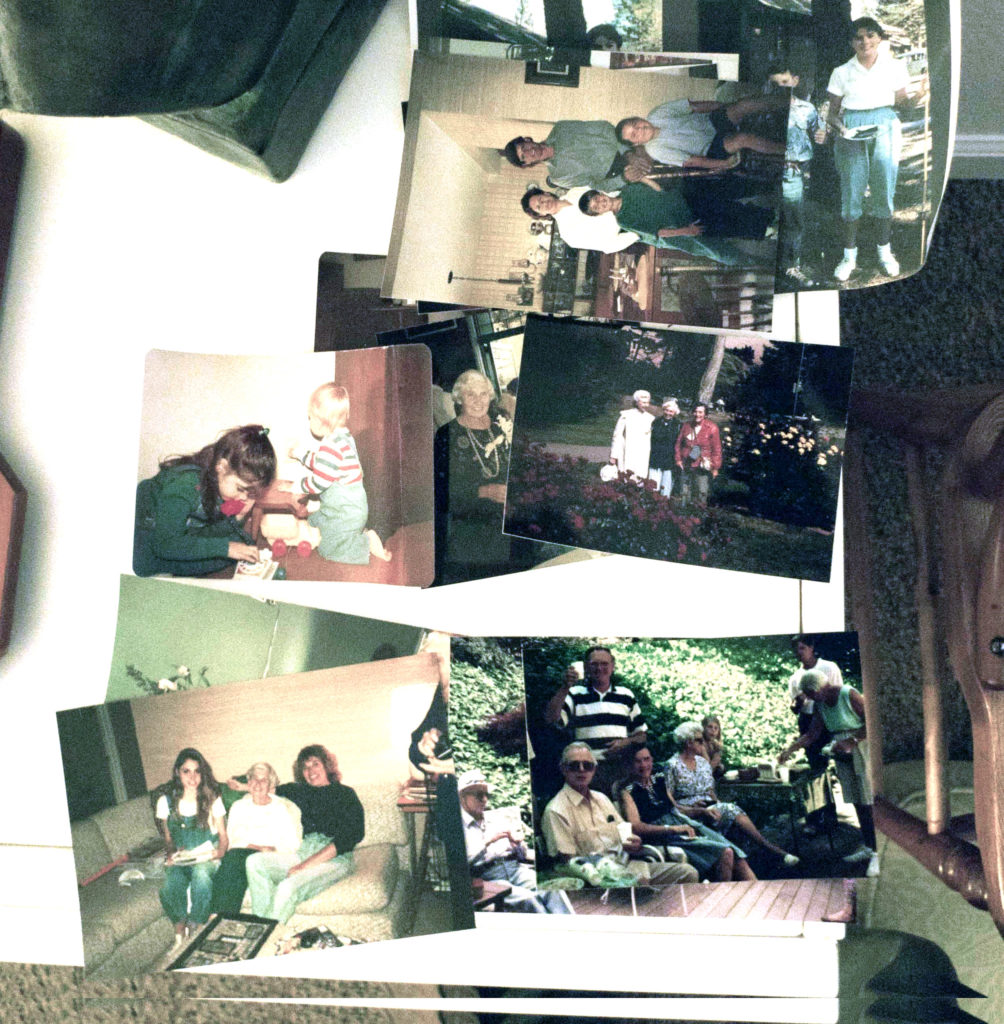
Leslie’s arrangement of some photos I brought the first time I visited her at Kairos. She enjoyed looking at photos, and she also was interested in organizing them. After she arranged some of these photos on her bed during that first visit, Leslie’s sister asked her, somewhat rhetorically, “Oh, I see you’re trying to organize some photos!” Leslie responded by saying, “More like trying to organize my life!”
Leslie also likes looking at photos of friends and family members and organizing them. When I bring her paper prints she will arrange them into little displays as we look at them one by one. She is also adept at swiping through photos on an iPhone or iPad. If I pull out my iPhone to show her a photo, she’ll want to take it from me and look for herself. She also seems to like it when I tell her what the photos are of. However, if I provide too much information, she’ll tune out. She also likes looking at and reading cards she gets in the mail. I’ve seen her hold a card and read it, over and over, for 10 or 15 minutes, during which she seems to be processing something—though I’m not sure what, because. . .
Leslie has extensive “expressive aphasia” (I think that’s the clinical term for not being able to express anything with words). She can’t make sentences to communicate what she’s thinking or feeling, and she can rarely string together more than a few words at a time—though there have been some considerable surprises for me about that. The word strings she does come up with usually are in relatively good order and make sense, grammatically, but they’re incomplete.
Asking Leslie to participate actively in a conversation by talking, answering questions, etc. can bewilder her. She seems to me as if she’s trying to do all the thinking and feeling that any of us do when we have a conversation, but she’s struggling to do it without the props that language provides—which can be frustrating. She can’t use her own voice and language skills to help organize, focus, project, and confirm her thoughts and feelings the way the rest of us can.
Leslie appears to follow much more language than she can generate, but it’s difficult to determine exactly what she understands or how close she’s following. She can’t ask the kind of questions we use to get further clarification, but she gives lots of evidence in what she does that she’s understood something. As one mundane example, if I say “move your feet so they’re more in the middle of your walker,” she’ll look down at her feet and move them to the middle of her walker. As another example, she’s very good at tracking conversations and following stories and gives all appearances of an active listener. When she’s paying attention, you can see that she’s waiting for the next development in a story, and she’ll sometimes ask, “And then what?” Because she’s lost the ability to talk, active listening is the primary mode in which she can participate in a “conversation” with someone else.
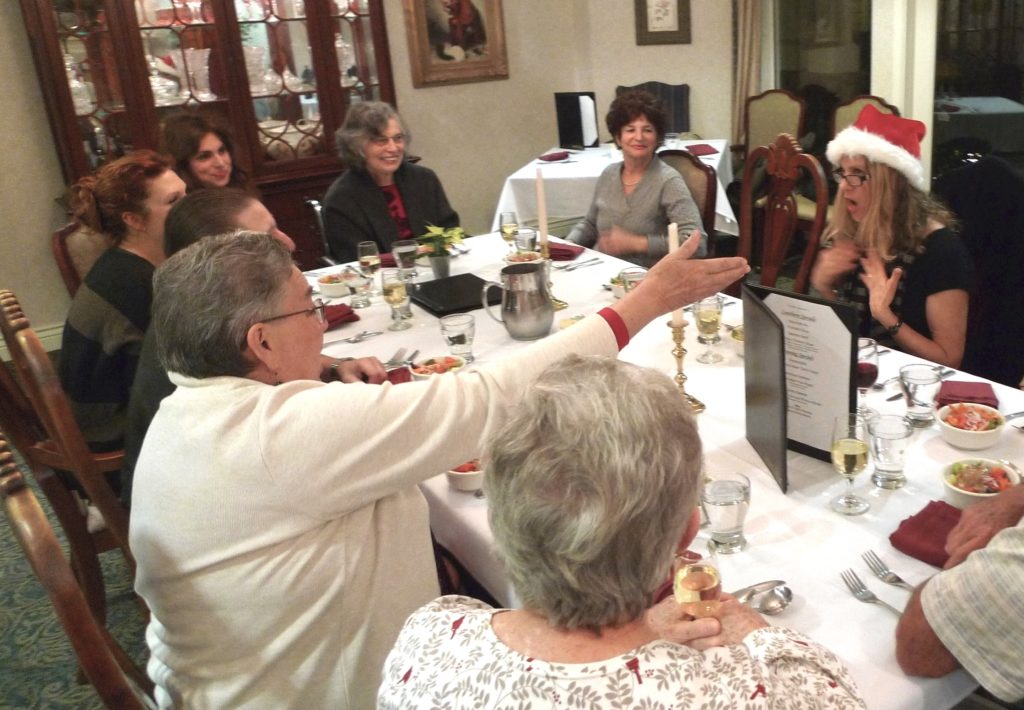
Leslie frequently becomes attentive and engaged if something’s going on among the people she’s with— e.g. having a conversation with each other, trying to solve a problem, telling a story, and so on as during the dinner parties Lisa arranged at Kairos this past year. If we’re walking the halls and we meet someone she knows who says, “Hi, Leslie,” she’ll sometimes say “hi” back. If that person stops and talks with us she’ll track and tune in, and her interest/attention/responsiveness increases if we talk with each other as if she’s part of the conversation. If someone says something to her directly that seems to heighten her engagement and attention (though she might not respond). However, if someone asks her a question with the clear expectation that she come up with an answer, she’s likely to get flustered and withdraw.
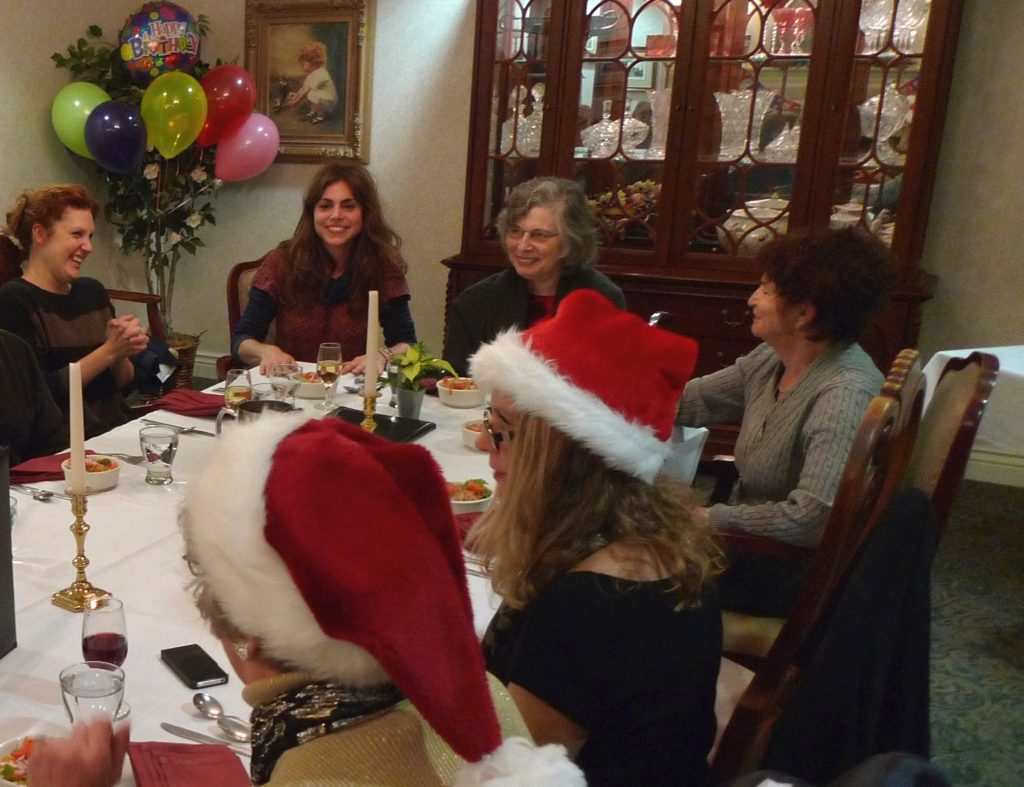
Leslie spends almost all her days now in a wheel chair. She can still take a few steps unassisted and can use a walker on her own for short distances (across the room, though she is not someone who will “decide” to do that). Usually she is moved by staff in her wheel chair, but some staff also make extra efforts to help her walk around in her apartment, or between the lounge and dining areas (30 feet)—usually with a walker and their assistance. Her walking ability declined quite a bit a year or so ago and dropped a bit more 3-4 months ago, but it’s been pretty stable since, and in the last month or so has actually picked up a bit.
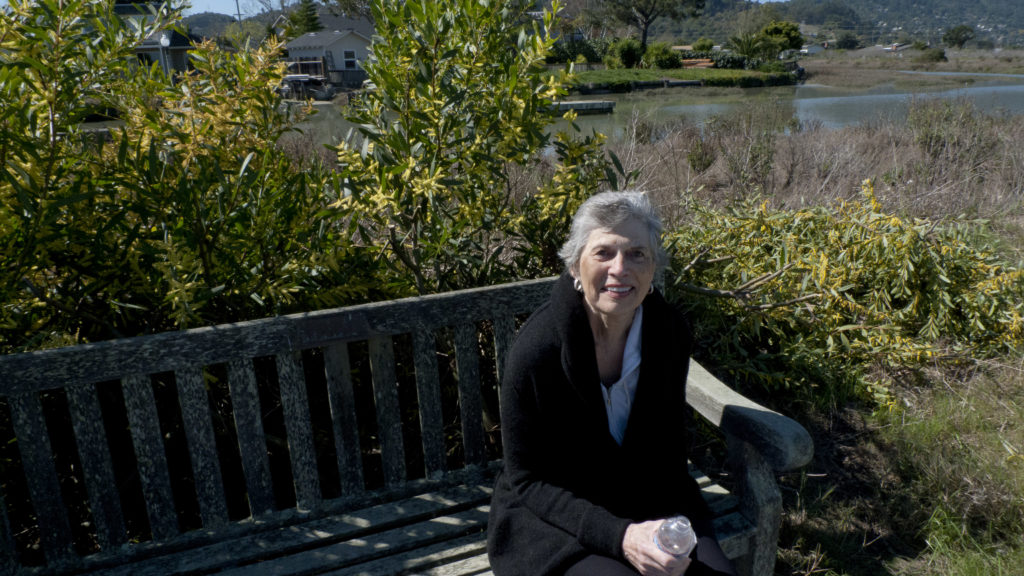
When I “take her for a walk” now, she uses a walker, and she’s also got me on one arm and a care staff member on the other, and we’re pulling the wheelchair behind us. The three of us usually go from her room down the main hall (to the right as you enter the building), turn the corner to the left and go to the door at the end of the hall, then stop, let her sit down in the wheel chair to rest for a few minutes, and then walk back. The total distance we cover is probably 300-400 feet. She does this pretty well some days, and not so well other days. This is a big change from when she first moved into her memory care home and she and I would take a walk together out into the wetlands.
If she’s watching TV when I ask about going for a walk, she’ll almost always say no, so I’ve sort of stopped asking. The phrase I’ve been using that seems to be agreeable to her is, “I thought we’d go for a walk today,” to which she usually says, “Oh, okay.” But sometimes she says, “No, that won’t work,” and I then say, “Oh, it will work. It always works, but we’ll wait for someone to come and help us.” When I actually start wheeling her away from the TV, I don’t think she’s ever protested.
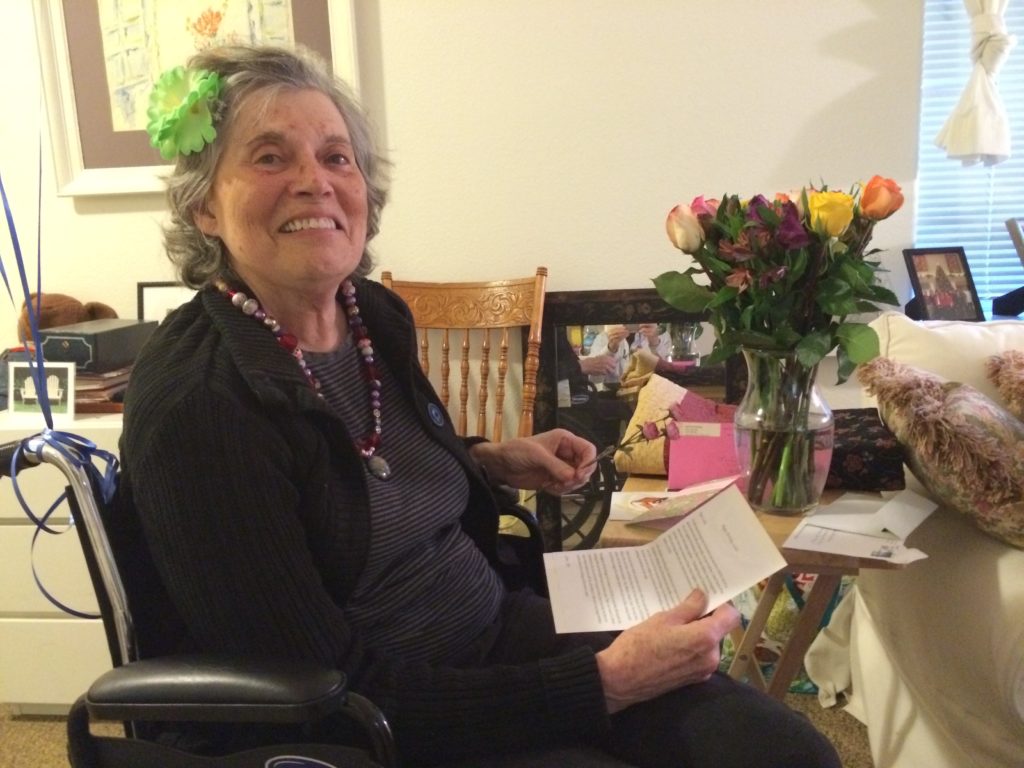
If she is sitting in front of a television that’s turned on, Leslie will watch it with interest, pretty much regardless of what’s showing: I Love Lucy reruns, Warriors basketball games, news, old movies, more recent movies. Anything. She does not seem to be zoning out (or nodding off) but rather zoning in. To what? I’m not sure, but it looks like she is “following” the implicit story lines embedded in everything we see on TV or in the movies (e.g. everything we see has been edited to lead the viewer forward, to get us to anticipate what’s coming next, and build what comes next on what came just before). I have no idea what she takes away from this as “content” but she does seem tuned into the process and flow of television and movie programming
A personal “conversation” with me is no match for TV. If Leslie’s watching TV she’ll usually look up when I come into a room and call out her name–or when the care staff call her name–and when I come close to her and sit down she’ll usually smile and maybe laugh a little, then shift her attention back to watching TV. If I try to talk with her, she might turn and look at me once or twice, but she’ll turn back pretty quickly and tune into whatever’s on the screen. I think she’s aware, from time to time, that I’m sitting next to her and that this is a plus for her, but I’m not sure.
A personal conversation with me is no match for music or story performances either. Leslie seems to get just as engaged in the “happy hour” music activities and various story-telling and group “discussions” as she does with television. If I show up and she’s sitting in on an activity of that sort, we’ll have our normal greeting and that’s about that. Once again, I think she’s aware from time to time that I’m there and that this is a plus for her, but I’m a sidelight to the main attraction.
She seems to enjoy going outside–in the courtyard or farther afield. After we walk the halls, I usually wheel her into the courtyard and we sit there for a while (15-30 mins) looking at the fountain and I don’t know what else. Sometimes I’ll tell her a story or two about things going on in my life, or show her some photos—on paper or on my iPhone. Sometimes we just sit. Sometimes someone will come by and talk with us.
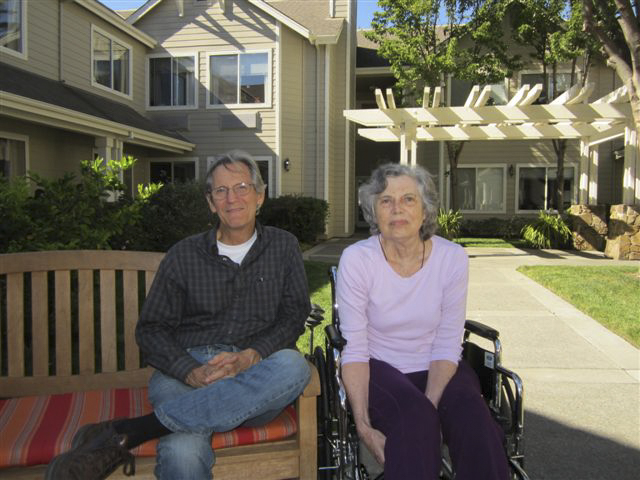
After Leslie became too unstable to walk safely away from her memory care home with just my assistance, we walked inside. But we both missed being outside, so I began talking her for at least a brief stroll through this inner courtyard. Over time, the stroll turned into a regular interlude of 10-20 minutes where we sat together, absorbed what the weather had to offer, and enjoyed each other’s company.
The care staff seem to really like Leslie. The people who work with her directly have told me that, and they act that way as well. Her current caregivers approach her without any of the caution they sometimes show towards other residents. Mary-Claude says with great affection, “Ahhh, Leslie is my Lady!” Care staff who have worked with her in the past but now have other assignments (Amanda and Errol, for example) always greet her warmly when they see her. Not sure if this is the right way to put it, but the care staff who work with her treat her as if she’s a somewhat special resource for them, someone they look forward to helping. It’s as if she’s managing her life with a kind of grace and civility that adds a lot to the care staff and to other residents.
Finding My Way with Leslie
I don’t mean to be too pat about it, but in some sense, the these observations and the three assumptions I noted above are what I have in mind when I go to see Leslie, and pretty much whatever I do with her follows from that. They’ve also become the only kind of “answers” I have to all the questions I started with.
As I noted above, most of my initial questions don’t quite make sense to me any more, but they’re questions I’m always asked by other people if they know I’m seeing Leslie. As a result, I almost always fall short of providing good answers. When Lynne asks me, “How was Leslie?” I really don’t know what to say other than, “We had a pretty good visit today,” or “Okay. Her knee was bothering her a bit, so we didn’t walk as far,” or “When I got there they already had moved her to the happy hour music place, so I just stayed with her there for the show” (which is what happened on St. Patrick’s day). So I don’t really know “how” Leslie is in some broad, qualitative sense of “good” or “bad.” I just know what she and I did the last time I saw her and the time before that and whether it was a good visit for me or not.
This is not to say I’ve run out of questions about Leslie and what’s going on with her. It’s just the those questions now focus mzinly on what’s up the day I get there and how I can respond to that in a way that will be okay for me and for her. Maybe that’s because she seems relatively stable and in relatively good spirits.
I do wonder pretty much every day I visit what we’ll do today. And I hope the logistics for at least a walk will fall into place after I arrive. Will I be able to get a care staff member to help me walk her down the hall? Can we get going on that after the shift change and before they move her to the Thursday afternoon happy hour/music session (which she seems to enjoy and really don’t like pulling her out of)? And I’ll hope her knee is not bothering her, or, if it is, that we can reduce the discomfort enough for her to walk. But if you pushed me, I’d probably say she seems to be doing very well and that where she is seems like a very good place for her to be. I think that’s how Lynne sees things and I think it’s pretty much how Lisa sees them too.
Actually, one of the ironies I’ve noted is that the Lisa I know now is actually at least as different from the Lisa I knew years ago (as a child and teenager) as the Leslie I know now is from the Leslie I used to know! Another irony is that here I am writing pages of words to the two of you in hopes of bringing you up to date. But when I first contacted Lisa about seeing Leslie, she gave me pretty much a complete picture in two sentences: “She can’t talk much at all and she can’t do very much either, so if you expect her to entertain you, you’ll probably be disappointed. But she does seem pretty okay living where she is, and if you’d like to visit, I know she’d enjoy seeing you.”
I thought I understood what Lisa said at the time, in January of 2012, but I’m still coming to terms with those two sentences. Every time I’ve seen Leslie so far, I’ve found a way to care about her that’s rewarding to me. But to do so, I have to learn each time a little more about what “doesn’t talk much” and “doesn’t do much” can mean. It also seems like I have to learn something new each time about what the words “expect” and “entertain” mean for me. I didn’t envision having to learn about things like that before I started seeing Leslie. And it’s been challenging at times, but it’s also been quite a gift to visit with her as regularly as I do.
I hope these comments give you some updated insights into Leslie’s circumstances. I know she cares about you both and would like to see you. She doesn’t talk much and she doesn’t do much, but she seems pretty okay with living where she is, and I know she’d enjoy seeing you.
I certainly look forward to seeing you as well!
Jon
